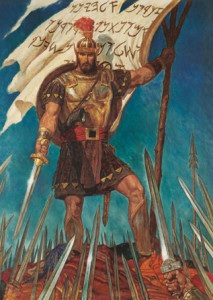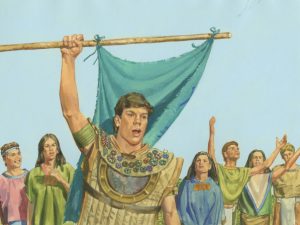There have been many times in my life when I have been like Captain Moroni.
I should probably be specific, because no, I haven’t led armies into battle, nor have I been a standard bearer to encourage people to go into battle. I guess it could be said that sometimes I have led battles against Satan, but that could be said about all of us. But to be compared to how Moroni is described in Alma 48:17?
Yea, verily, verily I say unto you, if all men had been, and were, and ever would be, like unto Moroni, behold, the very powers of hell would have been shaken forever; yea, the devil would never have power over the hearts of the children of men.

Captain Moroni
Yeah, I can’t claim that!
What I am speaking of, however, is when Moroni, in Alma chapter 60, writes his epistle (letter) to Pahoran, the chief judge of the time, and demands to know why the armies have been ignored. Why haven’t provisions come? Where is the support? Why the silence? What in the world is going on? If you don’t do what we need, I’m going to have to come make you do it because we’re talking about our lives and our country, here!
From there, we learn from Pahoran, in chapter 61, that life in Zarahemla is not all peachy –in fact, they were struggling greatly with dissenters and their own battles. A coup has taken over the government and Pahoran has fled for his life!
He is grateful for Moroni’s concern and he begs him to come help him. Moroni then, relieved Pahoran hadn’t failed him after all, leads his armies back to Zarahemla to overthrow the coup and put the government back together again.
We often learn in Sunday School that Pahoran and Moroni are wonderful examples in this instance (and they are) because of how they communicated one with another. There is great concern, there is straight-forward communication, but there is immediate forgiveness. It shows the strength and goodness of both leaders.
But back to how I’m like Captain Moroni: I quite often assume things when I don’t have all the information. Like Moroni, I demand answers and I’m not happy when I don’t know them.
How many times have you, dear reader, assumed something about a situation or a person before knowing all the answers? Perhaps, because of your experience and circumstances, you make these assumptions because it’s the quickest way to gain an answer to a question…
Why are they late?
Why is she neglecting her children?
Why is he not showing up to do his calling in church?
Why are they divorced?
Why don’t they have children, yet?
Why has she stopped communicating with me?
Why is he not married?
 Why did she quit school?
Why did she quit school?
There are a lot of answers about other people that we do not have the privilege –nor the right –to demand. But because we need the answers to form opinions or to seek solutions, we will make them up (assume) until we can learn more.
Captain Moroni did this, dear reader. He assumed Pahoran was abusing his power and using the provisions the armies needed for himself and the government. He assumed they had been abandoned. But to his own credit, as soon as he learned the truth, he repented of his assumptions and came to Pahoran’s rescue.
I think all of us do this. How many times have you heard the phrase (uttered by others or even yourself), “If I had only known…” to excuse our uncharitable behavior? Knowledge is power, and because of this, we even have laws in place that protect us when we do things out of lack of knowledge.
Even the gospel of Jesus Christ has this provision! Those who don’t know are not held accountable for their lack of knowledge. People who do not make covenants are not held to a higher standard. It just makes sense.
But what kind of excuse is that when we interact one with another in a family or even a church setting? We are too quick to assume, judge, and even condemn. We can’t possibly know everyone’s full story, so there’s little to gain in knee-jerk assumptions.
Now, let’s look at another example in the exact same story. In Alma chapter 58, Helaman talks about the same frustrations in not receiving provisions for his armies. He says:
9 And now the cause of these our embarrassments, or the cause why they did not send more strength unto us, we knew not; therefore we were grieved and also filled with fear, lest by any means the judgments of God should come upon our land, to our overthrow and utter destruction.
10 Therefore we did pour out our souls in prayer to God, that he would strengthen us and deliver us out of the hands of our enemies, yea, and also give us strength that we might retain our cities, and our lands, and our possessions, for the support of our people.
11 Yea, and it came to pass that the Lord our God did visit us with assurances that he would deliver us; yea, insomuch that he did speak peace to our souls, and did grant unto us great faith, and did cause us that we should hope for our deliverance in him.
12 And we did take courage with our small force which we had received, and were fixed with a determination to conquer our enemies, and to maintain our lands, and our possessions, and our wives, and our children, and the cause of our liberty.

Moroni waves the Title of Liberty.
What was it that Helaman chose to do? Pray to God and ask for strength. They didn’t have the answers or the solutions they were seeking, and so they asked God to give them strength and courage. And He did. He gave them peace, faith, and hope.
Once they had this courage and strength, did they receive the answers? No, they didn’t. Not until Moroni later sent his epistle to Pahoran and receive one in return did Helaman learn of the reason why they weren’t being supported by the government.
Now, dear reader, I don’t point this out to show that somehow Helaman was more righteous than Moroni –Moroni was correct, as the general over all the armies, to write to Pahoran to find out what was going on.
His response wasn’t wrong. But I think if we were to apply these scriptures to ourselves, it would be good for us to apply Helaman’s response more readily (and definitely more often!).
What happens when we have questions about things that have no immediate answer? Do we seek God, or do we seek to blame others? Do we write petitions to church leaders, or do we go to the temple to pray? Do we wait patiently or do we rally others to join us in movements to fight against prophets?
I think Helaman had no idea his experience and his choice (and Mormon’s choice to use his account) would be so valuable for us. As I read this passage recently, I realized how much more improvement I need in this area. Not just because assumptions are wrong, but because it doesn’t leave any room for charity, long suffering, and patience.
Our church is a church of question-asking. It was restored to the Earth because of a question! We are encouraged to be constantly asking questions and seeking answers, either through prophets or personal revelation. That’s just how we work, because that’s how God works.
Line upon line, precept upon precept… we learn bit by bit, as is our entire purpose in mortality. But each layer we build has the potential to teach us how to wait for the next layers, without losing faith in the meantime. Each layer can encourage us to have more patience with others, too, as they seek for the answers to their questions.
So, dear reader, I would encourage you, as you are seeking your answers, to have the boldness of Moroni in asking, but the patience of Helaman as you wait for the answers. Don’t stop asking, but go to God, and don’t give up. Like He did with the armies of Helaman, He gave them peace, faith, hope, courage, and strength. He will do the same for you.
About Cheryl S. Savage
Cheryl S. Savage has one incredible husband and seven sensational kids. Since earning her bachelor's degree in marriage and family studies at BYU many years ago, she spends her time raising the kids, teaching piano lessons, voraciously reading, traveling, romanticizing, writing, and learning. She and her husband have moved their family from coast to coast, but currently reside in Kansas.
Twitter •






